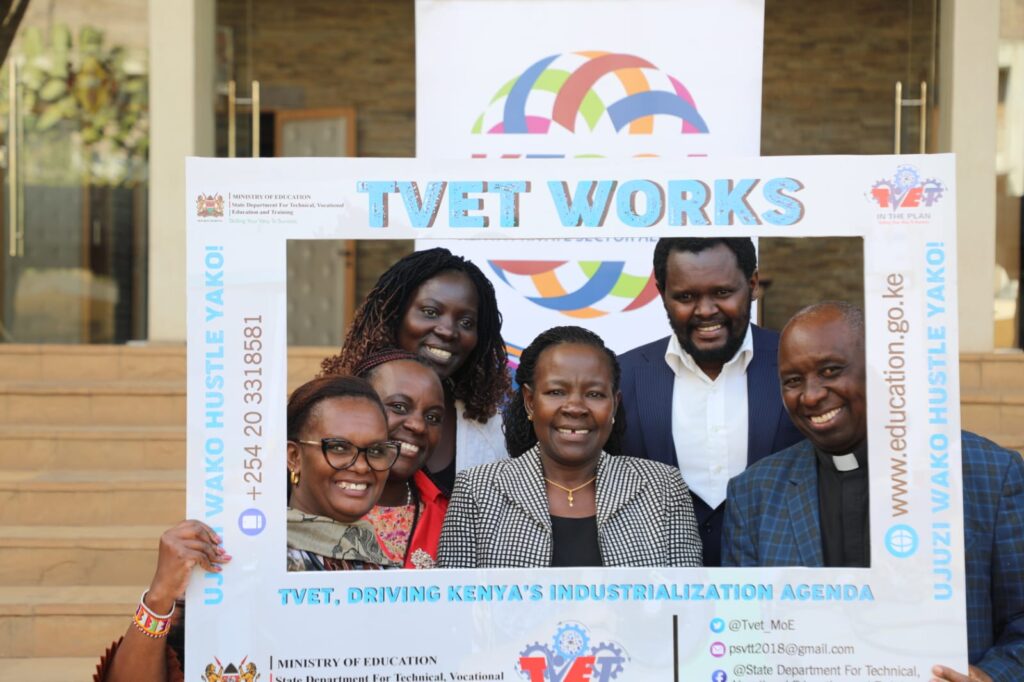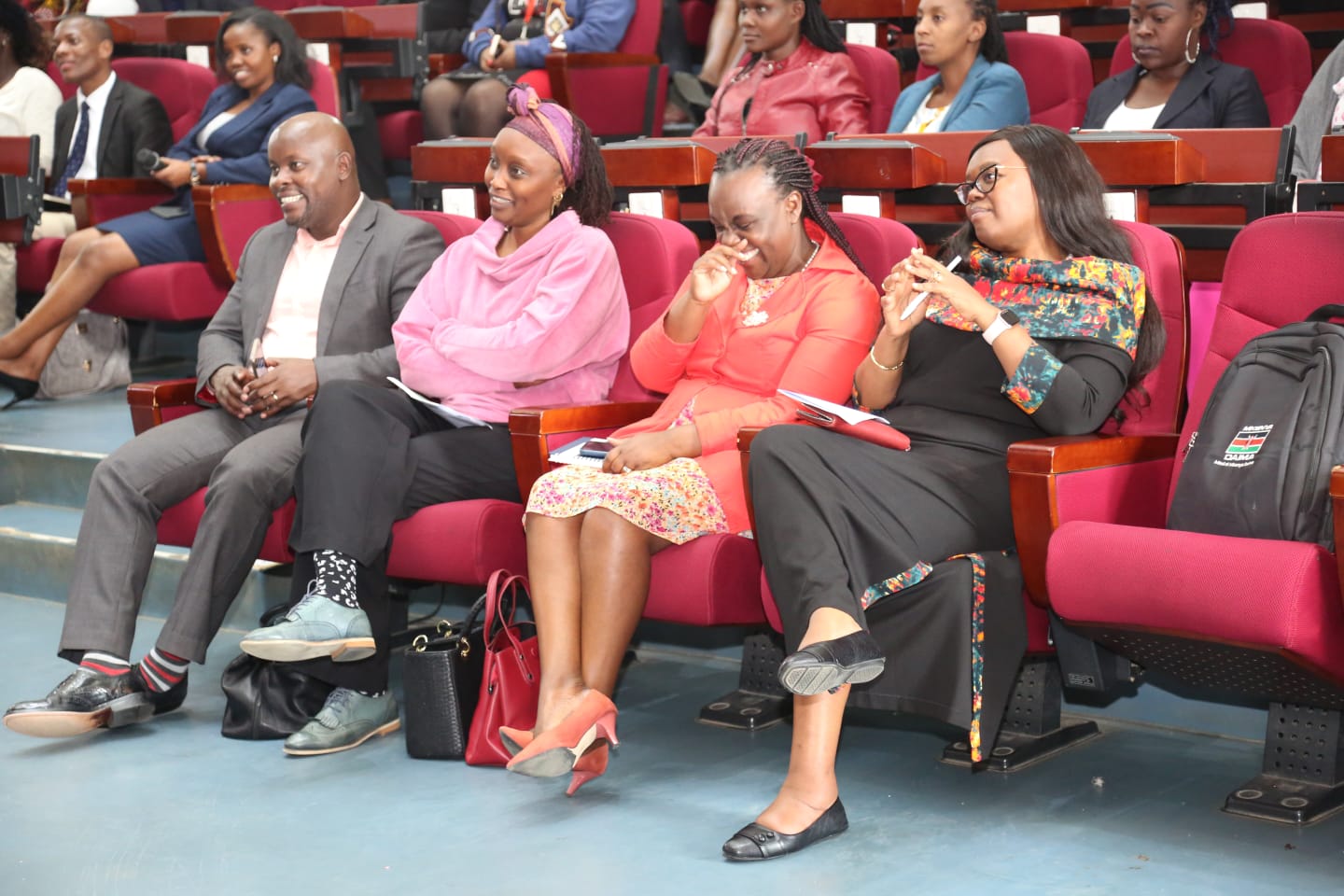Unleashing the Private Sectors Role in Skills Building For Young People

Kenya Private Sector Alliance (KEPSA) hosted the World Youth Skills Day 2023 at the Catholic University of Eastern Africa (CUEA), Nairobi, today, to discuss the role of the Private Sector in skill building for young people in line with this year’s World Youth Skills Day theme.
“Skilling teachers, trainers, and youth for a transformative future.” The outcome of the meeting was to contribute to shaping future strategies, policies, and initiatives in the education sector to enhance youth skills development.
In recent years, the world has witnessed unprecedented changes in technology, automation, and globalization, revolutionizing industries and transforming the nature of work. These advancements, while offering immense opportunities, have also posed challenges for young individuals aspiring to enter the workforce. The demand for traditional skills has diminished, making it imperative for young people to acquire relevant, adaptable, and future-oriented skills to thrive in the dynamic job market.

It is against the backdrop of the private sector’s crucial role in skills building for young people, harnessing their potential for economic growth, innovation, and social progress that KEPSA, through the its Education Sector Board organized the event.
Dr. Ehud Gachugu, Director, Youth Employment and Ajira Digital at KEPSA, highlighted KEPSA’s deliberate decision in 2010 to focus on youth and skills development interventions, specifically emphasizing Entrepreneurship and the Digital Economy.
He noted that the post-COVID period presented new perspectives on the skills development ecosystem, primarily due to the challenges of youth employment and skills deficit.
Dr. Gachugu stressed that private sector investment should be channeled into skills development, acknowledging the associated costs and emphasizing the need for crucial mechanisms such as mentorship to create avenues for skilling.
He underlined the importance of having skilling programs in place, highlighting several value propositions, including innovation for solving complex problems, the significance of the digital economy, the necessity of entrepreneurship, healthcare considerations, the globalized labour market with abundant global opportunities, and sustainability.
He further reiterated the need to possess skills beyond class education.
KEPSA’s Board Director for Education and Social Services, Ms. Mutheu Kasanga acknowledged
Kenya’s leading position in internet connectivity in Africa, and as such emphasized the need for a carefully designed training approach focusing on soft skills to tackle the employability challenge. Ms. Mutheu also underlined the importance of changing the examination system and addressing disparities in skills mismatch. She acknowledged the high cost of education and advocated for dual training to mitigate these costs. Dual training, she explained, would enable learners to convert learning into earning.
Speaking at the forum was the guest of honour, PS Dr. Esther Muoria of the State Department of TVET. The PS thanked KEPSA for their continued work in developing innovative skills development solutions. She called for Public-Private Partnerships in upskilling and acknowledged the reality of youth unemployment in Kenya.
The government, she noted, had implemented measures to curb unemployment, such as the Recognition of Prior Learning (RPL) tool, enabling assessment and certification of youth across different platforms.
Dr. Muoria also emphasized the fundamental role of skills in career progression and highlighted the ongoing curriculum review, with dual training becoming the model to reduce skills mismatch.
She called upon KEPSA to extend mentorship and support the youth in driving innovation and sustainability. She also stressed the need to transition from training-based to competency-based skilling and ensure that the education provided to the youth is flexible enough to be employable globally. She commended KEPSA’s Kenya Youth Employment & Entrepreneurship Accelerator Program (KYEEAP) and further proposed renaming internships to industrial training.
During a panel discussion on: Towards a coherent, inclusive, transformative and future-oriented youth skills development ecosystem, Arch. Nyamai Wambua, Head of Programs and Linkages at the Kenya National Federation of Jua Kali Associations, explained the concept of skills mismatch. Arch. Nyamai highlighted the importance of conducting training needs assessments and packaging curricula accordingly, emphasizing the necessity of training in collaboration with employers and industries. He also stressed the relevance of industry involvement in dual training.
Ms. Lynet Mwenda, Founder and Executive Director of Ujana Afrika, emphasized the significance of equipping youth with demand-driven skills to address the issue of skills mismatch. She noted the positive developments in policy drafting to support curriculum development, reiteraiting the importance of co-creating curricula with industry stakeholders.
Ms. Lynda Kassina, Project Manager Kibondeni College, presented case studies on dual training, underscoring the need for specific courses to be considered for training relevance, such as BCom. She proposed sustainable academia-industry partnerships, with the government allocating resources to incentivize youth involvement in industries. Ms. Kassina guided the youth, suggesting that the first degree should be a foundation for learning new competencies, and emphasized the importance of transforming challenges in Technical and Vocational Education and Training (TVET) into opportunities, highlighting the significance of both hard and soft skills in securing and retaining employment.
Proposals were made during the engagement, including providing industry stipends to support youth, in industrial training in all academic years, and ensuring that employers incorporate skills demand in their strategic plans to collect data.



